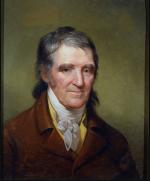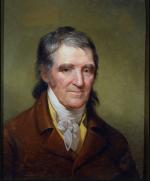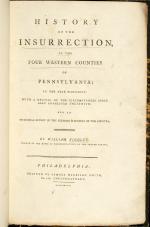![header=[Marker Text] body=[Near the western end of Latrobe was the log house of this antifederalist Congressman, who lived modestly alongside his constituents. A shaper of public opinion in western Pennsylvania, he sympathized with the Whiskey Rebellion but, as tempers mounted in late 1794, he worked to defuse violence. Findley's book on the Rebellion, written in 1796, rebutted Treasury Secretary Hamilton's analysis of its origins] sign](http://explorepahistory.com/kora/files/1/10/1-A-275-139-ExplorePAHistory-a0h8w6-a_450.jpg)
Mouse over for marker text
Name:
William Findley
Region:
Laurel Highlands/Southern Alleghenies
County:
Westmoreland
Marker Location:
PA 981 just SW of Latrobe
Dedication Date:
October 28, 1994
Behind the Marker
After the delegates who met in Philadelphia during that hot summer of 1787 hammered out a new constitution for the young nation, the states still needed to ratify it. With Antifederalist sentiment strong in rural Pennsylvania, its passage in the state was by no means secure. Pennsylvania Antifederalist William Findley helped lead the fight against ratification of the Constitution. In the state constitutional convention of 1789 he would also be a vocal opponent of the new and, from his perspective, undemocratic state constitution that the next year would replace the state government created by Pennsylvania's founding fathers in 1776.
Born in Ulster, Ireland, in 1742, William Findley immigrated to Pennsylvania in 1763 and settled as a farmer in Cumberland County. In 1783, he and his wife relocated their sizeable family of eleven children across the Allegheny Mountains to Westmoreland County, where his neighbors soon elected him to the Council of Censors, convened to determine whether the state constitution of 1776 needed to be revised. In this capacity, Findley championed the interests of the western counties who supported less state control over local affairs. Findley then served as a member of the Pennsylvania legislature and, briefly, on the Supreme Executive Council.
Elected to the Pennsylvania convention that ratified the federal Constitution in 1787, Findley insisted that the United States was "still bound by the confederation" and opposed the new constitution on the grounds that the delegates who drafted it had only been authorized to revise the Articles of Confederation. In a vote of 46 to 23, the Pennsylvania delegates on December 12, 1787 ratified the new federal Constitution. Realizing that the Federalists' triumph was not yet secured, Findley then worked with Robert Whitehill to propose amendments to the constitution which, he hoped, would require a second convention, where a more democratic and states-rights oriented document would emerge. He continued to write extensively against the constitution as other states debated ratification.
Robert Whitehill to propose amendments to the constitution which, he hoped, would require a second convention, where a more democratic and states-rights oriented document would emerge. He continued to write extensively against the constitution as other states debated ratification.
After serving in the Pennsylvania House of Representatives in 1790, Findley, in 1791, won election to the United States House of Representatives. He served there until 1817 with the exception of the years 1799-1803. Findley opposed the Whiskey Excise tax, passed by Congress in 1791. When the Whiskey Rebellion broke out in western Pennsylvania in 1794, he and Albert Gallatin attempted to mediate between the rebels and the government in Philadelphia. To this end, he conducted a regular correspondence with Governor
Albert Gallatin attempted to mediate between the rebels and the government in Philadelphia. To this end, he conducted a regular correspondence with Governor  Thomas Mifflin, keeping him informed of events in western Pennsylvania as they unfolded. Findley attempted to pacify the rebels when they met to determine a course of action against the tax collectors and, later, against the federal army. He also met with President Washington at Bedford County on October 9th in an unsuccessful attempt to convince him that order had been restored. In 1796 he would publish his own History of the Insurrection in the Four Western Counties of Pennsylvania in the Year 1794, the first account written from the perspective of the Whiskey Rebels.
Thomas Mifflin, keeping him informed of events in western Pennsylvania as they unfolded. Findley attempted to pacify the rebels when they met to determine a course of action against the tax collectors and, later, against the federal army. He also met with President Washington at Bedford County on October 9th in an unsuccessful attempt to convince him that order had been restored. In 1796 he would publish his own History of the Insurrection in the Four Western Counties of Pennsylvania in the Year 1794, the first account written from the perspective of the Whiskey Rebels.
Findley's four-year hiatus from the House of Representative from 1799 to 1803 can be accounted for by his willingness to work on the local level to rally western support for Thomas McKean's successful bid for governor in 1799. By that time many western voters were pleased that they had secured access to the Mississippi and land surrendered by Indians defeated by Anthony Wayne, all thanks to the Federalist administration. A native of Pittsburgh, Federalist candidate John Ross won several western counties. Findley's support proved critical for McKean, who won by only 6,000 votes out of some 70,000 cast.
Thomas McKean's successful bid for governor in 1799. By that time many western voters were pleased that they had secured access to the Mississippi and land surrendered by Indians defeated by Anthony Wayne, all thanks to the Federalist administration. A native of Pittsburgh, Federalist candidate John Ross won several western counties. Findley's support proved critical for McKean, who won by only 6,000 votes out of some 70,000 cast.
Findley returned to the United States House of Representatives as a Democratic-Republican during the administration of Thomas Jefferson and served through the Madison administration, becoming the senior representative of the House in years of service. Although a Jeffersonian, his fear of executive power led him to be the key congressman in creating the House Ways and Means Committee, whose principal function is to oversee government expenditures, taxes, and debt - and to require executive departments to justify their spending. (Neither the Federalists or their successors created the strong national state McKean and the Jeffersonians feared.) Along with colleague Robert Whitehill, Findley was an early champion of the localist, states" rights tradition in American politics that was defeated at the Constitutional Convention and again in the Civil War. This vital tradition, however, has continued to have strong supporters to the present day.
Born in Ulster, Ireland, in 1742, William Findley immigrated to Pennsylvania in 1763 and settled as a farmer in Cumberland County. In 1783, he and his wife relocated their sizeable family of eleven children across the Allegheny Mountains to Westmoreland County, where his neighbors soon elected him to the Council of Censors, convened to determine whether the state constitution of 1776 needed to be revised. In this capacity, Findley championed the interests of the western counties who supported less state control over local affairs. Findley then served as a member of the Pennsylvania legislature and, briefly, on the Supreme Executive Council.
Elected to the Pennsylvania convention that ratified the federal Constitution in 1787, Findley insisted that the United States was "still bound by the confederation" and opposed the new constitution on the grounds that the delegates who drafted it had only been authorized to revise the Articles of Confederation. In a vote of 46 to 23, the Pennsylvania delegates on December 12, 1787 ratified the new federal Constitution. Realizing that the Federalists' triumph was not yet secured, Findley then worked with
After serving in the Pennsylvania House of Representatives in 1790, Findley, in 1791, won election to the United States House of Representatives. He served there until 1817 with the exception of the years 1799-1803. Findley opposed the Whiskey Excise tax, passed by Congress in 1791. When the Whiskey Rebellion broke out in western Pennsylvania in 1794, he and
Findley's four-year hiatus from the House of Representative from 1799 to 1803 can be accounted for by his willingness to work on the local level to rally western support for
Findley returned to the United States House of Representatives as a Democratic-Republican during the administration of Thomas Jefferson and served through the Madison administration, becoming the senior representative of the House in years of service. Although a Jeffersonian, his fear of executive power led him to be the key congressman in creating the House Ways and Means Committee, whose principal function is to oversee government expenditures, taxes, and debt - and to require executive departments to justify their spending. (Neither the Federalists or their successors created the strong national state McKean and the Jeffersonians feared.) Along with colleague Robert Whitehill, Findley was an early champion of the localist, states" rights tradition in American politics that was defeated at the Constitutional Convention and again in the Civil War. This vital tradition, however, has continued to have strong supporters to the present day.
Beyond the Marker







